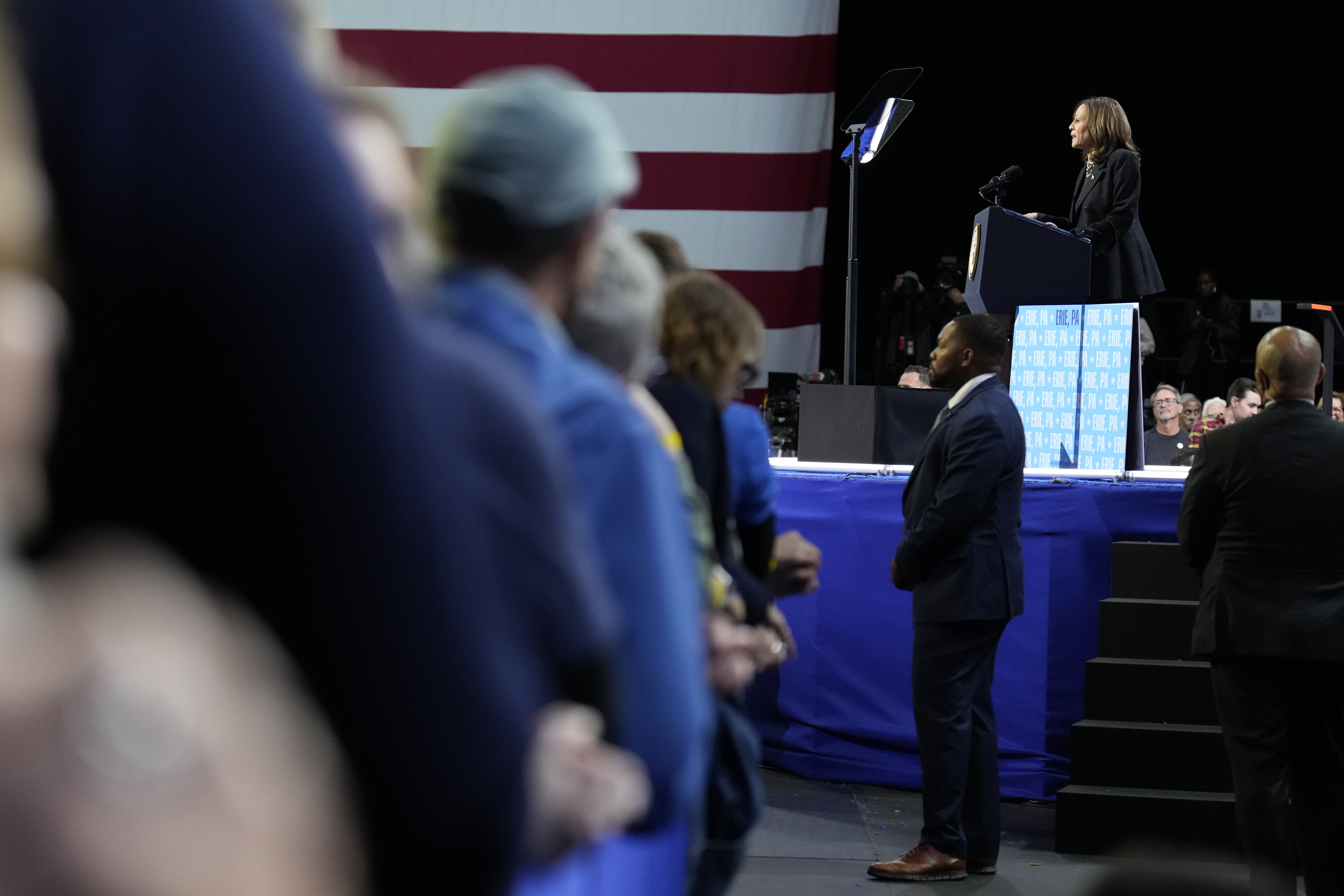'Extremely Alarming and Concerning': A Democratic Operative's Sleepless Concern
In the essential state of Pennsylvania, both Republican and Democratic groups are experiencing sleepless nights. Two campaign operatives discuss the reasons behind this unrest.

Blue-collar voters have strong ties to former President Donald Trump, while white women, galvanized by the overturning of Roe v. Wade, are increasingly leaning toward Vice President Kamala Harris. Black male voters appear to be disengaging, and Latino voters are trending Republican. Regions that were previously considered safe for one party are suddenly competitive. The question of voter turnout in a state that has been decided by a mere 1 percentage point in recent elections is causing anxiety among campaign operatives, who must decide whether to target new voters or reinforce their base.
To gain insights into these developments, I spoke with two local experts for this week’s Playbook Deep Dive Podcast: Philadelphia City Councilmember Isaiah Thomas, who chairs Black Men for Harris Pennsylvania, and Charlie Gerow, a seasoned political operative in Harrisburg who has also run for office.
In our discussion, they unpacked the regions and demographics critical for their respective campaigns, highlighting surprising common ground on the importance of southwestern Pennsylvania for both candidates.
This conversation has been edited for length and clarity by Deep Dive Producer Kara Tabor and Senior Producer Alex Keeney. You can listen to the complete interview on Apple, Spotify, or your preferred podcast platform.
Gentlemen, let’s start with an easy one. How much will your candidate win Pennsylvania by?
Isaiah Thomas: This race is so close. Every single day we're looking to push people just to get out the vote. I think that's the biggest thing for us in Philadelphia and our surrounding area. And at the end of the day, I do believe the Harris campaign will be victorious. And if I had to take a soft guess, then I’ll say by plus three points.
Charlie, how about you? How much will Donald Trump win Pennsylvania by?
Charlie Gerow: I'm a little more conservative, so I believe that Donald Trump will win Pennsylvania by two points, which, in the grand scheme of things, is a landslide. Because as you know, in the previous two campaigns for the presidency, Pennsylvania has been razor thin.
So, landslides all around. When you think about the most critical regions for Donald Trump, where must he win big?
Charlie Gerow: Well, he's got to run up the vote in the vaunted “T” of central Pennsylvania and the northern tier. But he also must perform well in the southwest, where historic Democratic towns and cities are now voting heavily Republican. If he does, I think he is the next president. The other area that might be interesting to look at is the collar counties surrounding Philadelphia, like Bucks County, which recently switched from registered Democrat to Republican.
Councilman, what regions are must-wins for Harris?
Isaiah Thomas: I would pretty much say the opposite of what Charlie just said. Southeastern Pennsylvania is big for the Harris path to victory. Allegheny County is crucial, as are the counties in between it and Philadelphia. If turnout in those areas meets expectations, we believe that suburban counties like Montgomery will follow suit. The real question is how many people will actually come out to vote.
The Harris campaign has made an effort to reach areas where Democrats don’t usually go. Does that seem effective, Councilman?
Isaiah Thomas: I don't think it’s a bad idea at all. Touching base with as many people as possible shows that their vote matters and that you care about them.
Charlie, should Trump’s campaign be concerned about Harris's outreach to those less-traditional areas?
Charlie Gerow: No. The reason is that Donald Trump is going to places where Republicans haven't traditionally gone, and he’s doing well there. That said, turnout is the deciding factor in this election. In Philadelphia, for example, early voting has not been favorable for the Democrats, lagging behind four years ago. So I think there are some weaknesses for the Harris campaign that might be worth addressing.
Harris is indeed focusing on the Philadelphia suburbs, indicating she’s aware of this message.
A notable element in the ground game is the Harris campaign claiming 50 coordinated offices and nearly 400 staffers on the ground, while Trump’s camp has more than two dozen offices, including targeted Latino outreach in Reading and Black voter engagement in Philadelphia.
Councilman, when examining the ground game, what stands out? Does it matter as much now given the current election climate?
Isaiah Thomas: The Harris campaign has built various coalitions. It’s important to have a physical presence as Vice President Harris entered the campaign later than former President Trump. There's a great deal of work involved in building momentum and educating voters about this election’s significance.
The Trump campaign seems to thrive on social media. Do you agree with that assessment, Charlie? Are they doing enough?
Charlie Gerow: Everyone likes to talk about the strength of their ground game. Still, indicators point to the topic of voter registration. The gap between Republicans and Democrats in voter registration has shrunk significantly and particularly this year. Many of those changing registrations are shifting from Democrat to Republican, which is a result of grassroots efforts and effective campaigning.
Early voting indicates this trend as well. Republicans are becoming more adept at banking their votes, which contrasts sharply with the Democrats’ numbers. The shortfall for Kamala Harris among African Americans is quite significant.
Councilman, what’s causing the narrowing gap in voter registration? Is Charlie right to say that turnout among Republicans appears higher than Democrats?
Isaiah Thomas: There are indeed warning signs around voter participation. Our main focus is ensuring people head to the polls to exercise their right to vote. Voter registration swings can be attributed to historical trends in swing states. Voters tend to shift their allegiance between parties based on the party in the White House.
The anxiety is palpable, and while I believe we will win, it doesn’t prevent sleepless nights filled with concern over what another Trump presidency would entail for cities like Philadelphia.
What causes these shifts in voter sentiment?
Isaiah Thomas: I wouldn't frame it as a problem with the Democratic Party. It’s a natural result of being in a swing state. We can’t ignore the factors affecting voter dissatisfaction on both sides.
Charlie Gerow: I agree with the councilman that anxiety is a shared experience.
Which voter demographics will wield the most influence in this election, Charlie?
Charlie Gerow: The most significant demographic shifts in Pennsylvania challenge traditional party roles. There’s a growing populist coalition that has emerged over the years. Increasingly, union households are supporting Donald Trump.
Isaiah Thomas: While I appreciate the perspective, I contend that white women will play a pivotal role in this election. Issues like a woman's right to choose resonate deeply and can significantly impact the outcome.
With regard to union support, there seems to be a notable divide. What might this indicate about how people perceive the Democratic Party?
Charlie Gerow: Among the unions the councilman mentioned, Kamala Harris will likely perform well due to the differences in public sector unions compared to those in manufacturing and service roles, which are leaning toward Trump.
Isaiah Thomas: However, the unions supporting Harris represent a larger population than those for Trump. Many municipal workers across Pennsylvania will remain aligned with the Harris campaign.
Addressing the shift in Black male support for Democrats during this election cycle, Isaiah?
Isaiah Thomas: The issue is more pronounced if Trump weren’t the frontrunner. It's not common to find Black men who actively support him. However, the challenge lies in voter disengagement. Many feel disconnected from what government has done for them, leading to potential low turnout.
Charlie Gerow: It’s noteworthy that in previous elections, Trump garnered higher support among African Americans, particularly younger men. Many voters I’ve encountered express their disapproval of the current administration and say they won’t be voting for Harris.
When discussing the key issues on voters' minds, what are they, Charlie?
Charlie Gerow: The economy reigns supreme, with illegal immigration also being a hot-button issue, especially regarding fracking.
Isaiah Thomas: I concur that the economy is significant. However, I believe concerns over leadership fitness and recent Supreme Court decisions resonate strongly among voters.
It’s clear Pennsylvania's status as a bellwether state carries weight. What is the swingiest region?
Charlie Gerow: Southwestern Pennsylvania will play a pivotal role, especially traditionally Democratic areas now voting Republican.
Isaiah Thomas: I think Charlie’s assessment of southwestern Pennsylvania holds true. However, we should also keep an eye on Delaware County as another critical region.
Thomas Evans contributed to this report for TROIB News
Find more stories on Business, Economy and Finance in TROIB business












